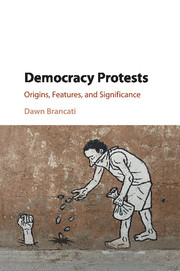Book contents
- Frontmatter
- Dedication
- Contents
- List of Figures
- List of Tables
- Acknowledgments
- 1 Introduction
- 2 Characteristics of Democracy Protests
- 3 Relating Economic Crises to Democracy
- 4 Analyzing the Rise of Democracy Protests
- 5 Analyzing Elections as Trigger Events
- 6 Historical Trends in Government Responses
- 7 Analyzing Political Accommodation
- 8 Historical Trends in Democratization
- 9 Analyzing Democratization
- 10 Conclusion
- Appendix: Data and Measures
- References
- Index
3 - Relating Economic Crises to Democracy
Published online by Cambridge University Press: 05 September 2016
- Frontmatter
- Dedication
- Contents
- List of Figures
- List of Tables
- Acknowledgments
- 1 Introduction
- 2 Characteristics of Democracy Protests
- 3 Relating Economic Crises to Democracy
- 4 Analyzing the Rise of Democracy Protests
- 5 Analyzing Elections as Trigger Events
- 6 Historical Trends in Government Responses
- 7 Analyzing Political Accommodation
- 8 Historical Trends in Democratization
- 9 Analyzing Democratization
- 10 Conclusion
- Appendix: Data and Measures
- References
- Index
Summary
Economic crises are a key factor behind the rise of democracy protests and can help explain the recent proliferation of democracy protests around the world, which has taken place in the presence of a downturn in the global economy. Economic crises make democracy protests more likely to occur, I argue, because they raise discontent within society for governments in general, and authoritarianism in particular, and elevate support for opposition candidates, who are more likely to organize protests when they believe that support for them is high. While economic crises are not the only issue likely to generate discontent against regimes and provoke mobilization, the economy is generally the most important issue affecting people's political attitudes across countries. Economic crises are also likely to affect the responses of governments to democracy protests. National leaders have less incentive to accommodate democracy protests when crises occur because they are less likely to retain power in open and competitive elections when the economy is not performing well. However, if economic crises are severe, and democracy protests very large as a result, national leaders are likely to be compelled to accommodate the protests and/or step down from power regardless.
POPULAR DISCONTENT IN ECONOMIC CRISES
Economic crises generally lead to popular discontent toward governments especially when the public perceives governments as having played a role in either precipitating the crises or in having managed them poorly (Lewis-Beck 1986; Powell Jr. and Whitten 1993; Lewis-Beck and Stegmaier 2000). The public has good reason to either credit or blame their governments for the state of the economy. Although governments do not have complete discretion over their economies, governments do have significant influence over them, and can contribute to economic crises in many ways, including poor fiscal policies, costly foreign and domestic wars, profligate spending, corruption, and so forth.
Authoritarian governments tend to have more discretion over their countries’ economies than democratic states because they are less open to the world economy via trade and investment than democracies (Jensen 2003; Milner and Mukherjee 2009), and face fewer checks and balances in domestic policy-making. Nothing stood in the way of the superstitious general Ne Win provoking an economic crisis in Burma in 1987, when he demonetized certain currency notes and replaced them with 45 and 90 kyat notes because they were both divisible by and added up to the lucky number nine.
- Type
- Chapter
- Information
- Democracy ProtestsOrigins, Features, and Significance, pp. 39 - 60Publisher: Cambridge University PressPrint publication year: 2016



